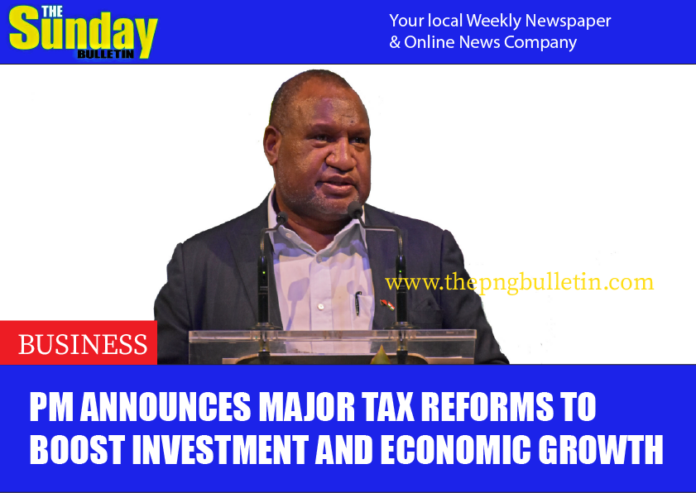PRIME Minister James Marape has announced a bold tax reform strategy aimed at fostering investment, increasing consumer spending, and driving local industry growth.
The reforms will take effect once Papua New Guinea’s economy reaches a K150 billion milestone, a target expected to be achieved within the next three to four years.
He announced this at the Back to Business Breakfast in Port Moresby yesterday.
The Prime Minister emphasised that these changes will create a business-friendly environment, ensuring that economic expansion benefits both investors and citizens.
Prime Minister Marape outlined key tax initiatives that will come into effect once PNG reaches the K150 billion economic threshold:
- Lowering corporate tax to encourage business expansion and attract further investment.
- Reducing personal income tax to increase disposable income and boost domestic consumption.
- Implementing stricter capital outflow regulations to ensure funds are reinvested locally rather than leaving the country.
“These tax reductions will create the conditions necessary for businesses to thrive, ensuring that investment remains in Papua New Guinea and continues to support employment, infrastructure, and industry growth,” said Prime Minister Marape.
To further strengthen PNG’s economic position, the government is focusing on Special Economic Zones (SEZs), including a tax-free business hub in Manus Province, designed to attract regional trade, investment, and industrial development.
“Our vision is to position Manus as a strategic trade hub, opening up new economic opportunities and fostering partnerships with businesses seeking to expand in the Asia-Pacific region,” said the Prime Minister.
Prime Minister Marape also called upon leading business organisations, including the PNG Chamber of Commerce, the PNG Business Council, the Manufacturers Council, and the Chamber of Resources and Energy, to collaborate with the government in identifying growth opportunities and shaping investor-friendly policies.
He highlighted import replacement and local manufacturing as key government priorities, urging multinational and domestic firms such as Trukai Industries and those in the food sector to invest in local production to reduce PNG’s dependence on imports.
“With the right incentives, streamlined regulations, and stronger industry collaboration, we can transform PNG into a regional centre for manufacturing and downstream processing,” the Prime Minister added.
The government is committed to:
- Reducing bureaucratic barriers to make investment easier and more efficient.
- Encouraging foreign and domestic businesses to scale their operations in PNG.
- Developing an industrial and manufacturing base to create jobs and reduce reliance on imports.
“This is a defining moment for Papua New Guinea’s economy,” said Prime Minister Marape.
“We are restructuring our fiscal policies to ensure PNG remains an attractive destination for investment while delivering tangible benefits for businesses, workers, and the wider population.”
The Marape-Rosso Government remains focused on building a robust, sustainable economy that supports private sector growth, employment creation, and long-term prosperity for Papua New Guinea.

